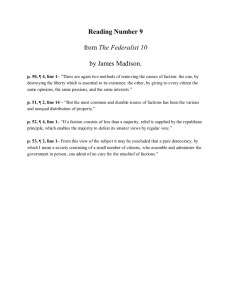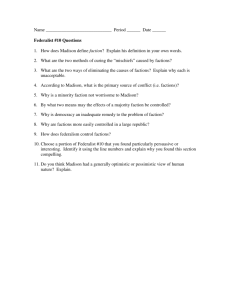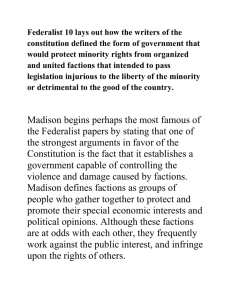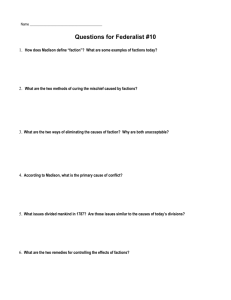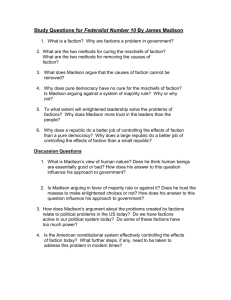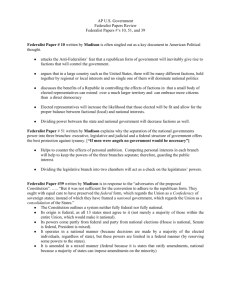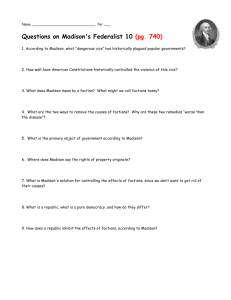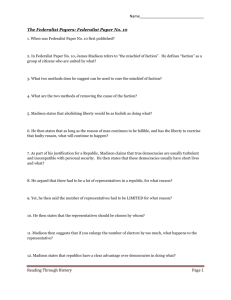PPT - Umbc
advertisement
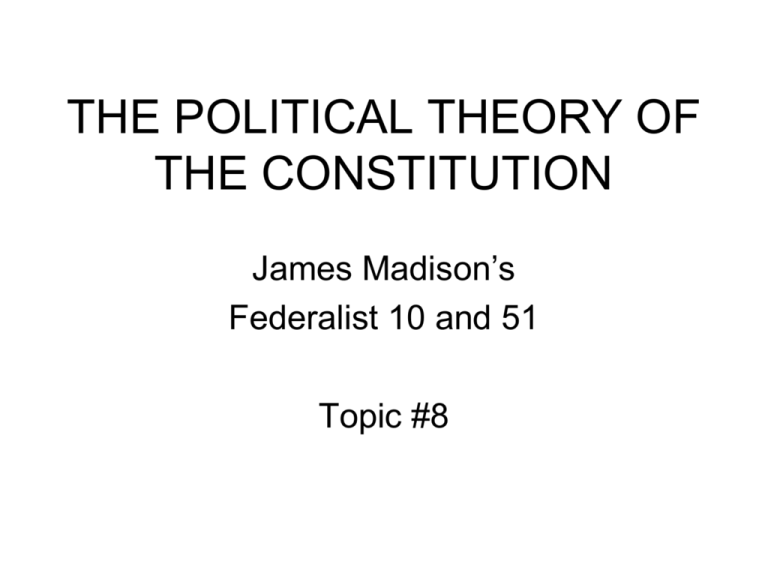
THE POLITICAL THEORY OF THE CONSTITUTION James Madison’s Federalist 10 and 51 Topic #8 Federalist 10 and 51 • Federalist papers #10 and #51, both by James Madison, are generally considered to be the most important and, over the subsequent years, the most influential of the 85 papers. • They are certainly the two that are the most widely discussed and (mostly) admired by contemporary political scientists. – They are now regularly included — along with the Declaration of Independence and the Constitution — in the appendices of American Government textbooks. • In these two papers, Madison sets out the basic theoretical rationale for the Constitution. – Madison would acknowledge that making the new central government as “democratic” as possible was not the Framers’ overriding motive. – Rather, it was to create a central government that would be • popular in form, and • effective (unlike the A. of C.), and • at the same time, safe — that is, non-tyrannical or “Lockean.” Two Forms of Popular Government • Madison [Fed. 10] distinguishes between two types of popular government [i.e., “government by the people”]: – a [pure] democracy, by which I mean a society consisting of a small number of citizens, who assemble and administer the government in person [e.g., “town meeting” or “participatory democracy”], and – a republic, by which I mean a government in which the scheme of representation takes place. • The two great points of difference between a democracy and a republic are: – first, the delegation of the government, in the latter, to a small number of citizens elected by the rest; – secondly, the greater number of citizens, and greater sphere of country, over which the latter may be extended. • Clear we mostly use the term “democratic” today to refer to systems that Madison would call “republican.” Popular Government • While generally supporters of “popular” (or what we today would loosely call “democratic”) government, the framers were not sentimental or uncritical supporters of such governments. – In their view, popular governments are not automatically desirable governments. – Because people • are rarely entirely benevolent, • are often self-seeking, • are often fallible, and • are sometimes driven by “passions.” • Jefferson: “Elective despotism is not what we fought for” (and the principles of the D. of I. cannot justify “elective despotism”). • A government that is strong enough to protect your property from theft by others are also strong enough to steal your property itself. The Dangers of Government [Fed. 51] • All governments, even popular ones, are potentially dangerous and oppressive. – If men were angels, no government would be necessary. – If angels were to govern men, neither external nor internal controls on government would be necessary. • In framing a government which is to be administered by men over men, the great difficulty lies in this: – you must first enable the government to control the governed [the A. of C. fails on this count]; – and in the next place oblige it to control itself [an unlimited Hobbesian government would fail on this count]. • A dependence on the people is, no doubt, the primary control on the government; but experience has taught mankind the necessity of auxiliary precautions. The Dangers of Government (cont.) • What is the danger against which such “auxiliary precautions” should be taken? – In general, tyranny, but let’s distinguish between two types. • Classical tyranny: a despotic government that oppresses the great bulk of the population (e.g., King George [maybe] or Saddam Hussein [certainly]) • Factional tyranny: one sector of the population that oppresses another sector of the population (e.g., potentially Shia and Sunnis in post-Hussein Iraq, or “tyranny of the majority”). – Madison to Jefferson: Wherever the real power in a Government lies, there is the danger of oppression. In our Governments the real power lies in the majority of the community, and the invasion of private rights is chiefly to be apprehended, not from acts of Government contrary to the sense of its constituents [i.e., classical tyranny], but from acts in which the Government is the mere instrument of the major number of the Constituents [i.e., factional tyranny, including tyranny of the majority]. – Federalist 51: It is of great importance in a republic not only to guard the society against the oppression of its rulers, but to guard one part of the society against the injustice of the other part. What Are the Auxiliary Precautions? • What auxiliary precautions can be taken against these dangers, and which does the actually Constitution use? – We framers rejected one possible precaution: a mixed regime, with built-in non-popular elements. – Fed. 51: One possibility is to create a will in the community independent of the majority [e.g., a “House of Lords”], that is, of the society itself; this method prevails in all governments possessing an hereditary or self-appointed authority. • But such “a power independent of the society” may itself become tyrannical. • And our goal was to preserve the spirit and the form of popular government, so we sought and found a republican remedy for the diseases most incident to republican government. Auxiliary Precautions (cont.) • According to Madison, such auxiliary precautions can be rooted in – the distinction between the republican and democratic forms of popular government, and – the opportunities presented by the republican form in encompassing an extensive compound republic. • Democratic government is necessarily simple, but republican government permits and requires a more or less complex structure of governmental institutions. – How big will its elected assembly be? – Will it be unicameral or bicameral? – How will it be elected? From districts or at-large? Using what kind of electoral system? – For terms of what length? Will they be staggered? – Will there be a separate executive? How elected? – Etc. Auxiliary Precautions (cont.) • The unavoidable complexity of the republican form provides opportunities for creating auxiliary precautions. • Fed. 51: We can so contrive the interior structure of the government as that its several constituent parts may, by their mutual relations, be the means of keeping each other in their proper places. • Madison is referring to the familiar “checks and balances” built into the Constitution: – – – – – among the three branches of the federal government, between the two houses that constitute the legislative branch, among the different levels of the federal court system, between the federal and state governments, and [we might add] between competing political parties. Auxiliary Precautions (cont.) • Such a separation of powers, e.g., between the legislative and executive branches, may be necessary to preclude tyranny -- or may not be (surely today there are many non-tyrannical parliamentary systems) – but in any event certainly is not sufficient. • That we need more than “mere parchment barriers” is illustrated by “the American [state] constitutions,” where we see the legislature has too often encroached on the executive branch, leading to potential tyranny. • Instead we must give each branch and component of government – by constitutional design – the means and resources sufficient – to protect its constitutional power against such encroachments and/or – to retaliate against and thus deter such and encroachments. • The occupants of these offices must also have the motive to use these resources, but this is pretty well assured because they will be ambitious political leaders. Auxiliary Precautions (cont.) • But the great security against a gradual concentration of the several powers in the same department, consists in giving to those who administer each department the necessary constitutional means and personal motives to resist encroachments of the others. The provision for defense must in this, as in all other cases, be made commensurate to the danger of attack. Ambition must be made to counteract ambition. The interest of the man must be connected with the constitutional rights of the place. • Think of the standard fair division procedure that may be used by two squabbling and distrustful children for dividing a piece a cake between them in a fair manner: – One child cuts, the other chooses. – Greed counteracts greed to produce a fair division. Auxiliary Precautions (cont.) • Experience has shown that legislative authority is naturally predominant in government. – This is the lesson of the “American [state] constitutions”. – So we want to strengthen the executive, and • divide the legislature into rival houses • with different schemes of representation – though remember that Madison at the Convention had vigorously opposed equal representation of states in the Senate. Auxiliary Precautions (cont.) • Such a system of constitutional “checks and balances” also mitigates problems of factional tyranny, in so far as they are driven by passions that arise quickly and then subside in due course. – Suppose some circumstance arises (e.g., a devastating terrorist attack) that creates a passionate majority that, if it got full control of the government, would try use governmental power to deprive some minority of its basic rights, i.e., that might become a “tyrannical majority.” • It will on average take such a majority about a year to get control of the House of Representative. • It will typically take it longer to get control of the Presidency, still longer to get control of the Senate, and longer still to get control of the Supreme Court and other courts. • In the meantime, passions are likely to subside, so no great harm can be done. Factional Tyranny • But in Federalist 10, Madison argues that the republican form of popular government offers a further protection again factional tyranny. – The republican (unlike the democratic) form can encompass a large political union, – and a large union typically incorporates a system of “social checks and balances” [among multiple “factions”]. The Mischief of Factions (Federalist 10) • By a faction, I understand – a number of citizens, – whether amounting to a majority or a minority of the whole, – who are united and actuated by some common impulse of passion, or of interest, – adverse to the rights of other citizens, or to the permanent and aggregate interests of the community. • Factions, if unchecked, cause problems. – If one faction becomes dominant, factional tyranny may result. – If two large factions become rivals, civil war (and/or anarchy) may result. The Mischiefs of Factions (cont.) • There are two methods of curing the mischiefs of faction: – the one, by removing its causes; – the other, by controlling its effects. • There are again two methods of removing the causes of faction: – the one, by destroying the liberty which is essential to its existence; – the other, by giving to every citizen the same opinions, the same passions, and the same interests. • But – the first remedy is worse than the disease, and – the second expedient is impracticable, as the latent causes of faction are sown in the nature of man [vs. Jefferson’s ideal of “agrarian democracy”]. Controlling the Mischiefs of Factions • So the CAUSES of faction cannot be removed, and . . . relief is only to be sought in the means of controlling its EFFECTS. • How to control the effects of factions? • Minority vs. majority factions: – If a faction consists of less than a majority, relief is supplied by the republican principle [i.e., majority rule], which enables the majority to defeat its sinister views by regular vote. • A minority faction may clog the administration, it may convulse the society; but it will be unable to execute and mask its violence under the forms of the Constitution. – When a majority is included in a faction, the form of popular government, on the other hand, enables it to sacrifice to its ruling passion or interest both the public good and the rights of other citizens. To secure the public good and private rights against the danger of such a [majority] faction, and at the same time to preserve the spirit and the form of popular government, is then the great object to which our inquiries are directed. Controlling the Mischiefs of Factions (cont.) • The republican form of popular government permits the formation of a extensive (and probably compound, i.e., confederal or federal) union. • The question resulting is, whether small or extensive republics are more favorable to the election of proper guardians of the public weal; and it is clearly decided in favor of the latter by two obvious considerations: – In a large republic public opinion is more refined through the process of representation. – The other point of difference is, the greater number of citizens and extent of territory which may be brought within the compass of republican than of democratic government; and it is this circumstance principally which renders factious combinations less to be dreaded in the former than in the latter. Controlling the Mischiefs of Factions (cont.) • A large republic takes in a greater diversity of interests and opinions. – So it is less likely than any single faction (united in opinions, interests, and passions) will have majority status. – Rather lots of (potential) minority factions will exist, which tend to “check and balance” each other. – Elections will be won and laws passed by coalitions of minorities, which must make compromises among themselves. – Even if a majority faction does exist, it numbers will likely be spread out over a large area, making coordination difficult. Controlling the Mischiefs of Factions (cont.) • The smaller the society, the fewer probably will be the distinct parties and interests composing it; the fewer the distinct parties and interests, the more frequently will a majority be found of the same party; and the smaller the number of individuals composing a majority, and the smaller the compass within which they are placed, the more easily will they concert and execute their plans of oppression. Extend the sphere, and you take in a greater variety of parties and interests; you make it less probable that a majority of the whole will have a common motive to invade the rights of other citizens; or if such a common motive exists, it will be more difficult for all who feel it to discover their own strength, and to act in unison with each other. • This was a novel argument at the time, when the popular wisdom (reflected in arguments made by the Antifederalists) was that stable popular government could exist only at the local (or possibly state) level. Study Guide Q4 • In 1787, many states still had established churches (e.g., the Congregational Church in Massachusetts and other New England states, the Anglican [Episcopal] Church in many southern states [including Virginia until shortly before 1787]) and also had religious tests for holding public office. The U.S. Constitution established no church and prohibited any kind of religious test for holding U.S. office. How does this fact lend support to Madison’s argument in Federalist #10?
